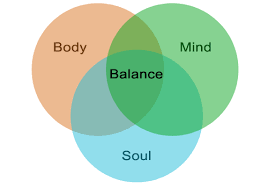Ayurveda is a philosophy of life concerned with the preservation & promotion of a healthy life-style. It arose about 5,000 years ago in India in the Himalayas and is considered the world’s oldest documented system of medicine. The earliest written records go back 3,000 years. It is said to have brought to Mother Earth from the Divine World.
The term “Ayurveda” has its origin in Sanskrit. “Ayus” means life or life-span; “veda” means knowledge or also science.
The composite term Ayurveda therefore means not just “knowledge of life”, but embodies an aspiration to live one’s life in the best-possible state, physically and mentally. The Ayurvedic philosophy aims towards a long and above all healthy & disease free life in the sense of a balanced style of living – based on the three pillars of body, mind and soul.
The focus of Ayurveda, hence, is not only on the treatment of disease, but also on prevention through purification and revitalisation.

The person is seen as a unity of body, soul and mind – and any course of treatment must therefore be geared to the patient’s individual needs.
Ayurvedic treatment therefore starts with an initial examination by the Ayurvedic doctor. This includes recording the disease history and the current lifestyle habits, along with a Body Composition Analysis (प्रकृति परीक्षा) pulse diagnosis (नाडी परीक्षा) and a physical check-up. The physician analyses the Dosha type according to the Ayurvedic Tridosha model & treats the doshas which have gone vitiated.
Doshas exist in every person in his or her own personal mix from birth. They ought to always be in harmony with each other – even if their relative strengths can shift in the course of a lifetime.
The right balance of the Doshas is essential for physical and mental health. An unhealthy and unbalanced life-style or changes in the person’s circumstances cause a shift in the natural balance of Doshas. This disturbance of the equilibrium leads to Disease occurance, according to Ayurveda science.
The main objective of any Panchakarma treatment is the restoration of this balance. The elementary features of any course of treatment are oil massages and various herbal and purification treatments as well as yoga and meditation. The precise treatment programme has to be drawn up individually for each guest. The same applies to the Ayurvedic diet plan. Depending on the Dosha constitution, the same spice or ingredient affects the balance of the Doshas in different ways.

